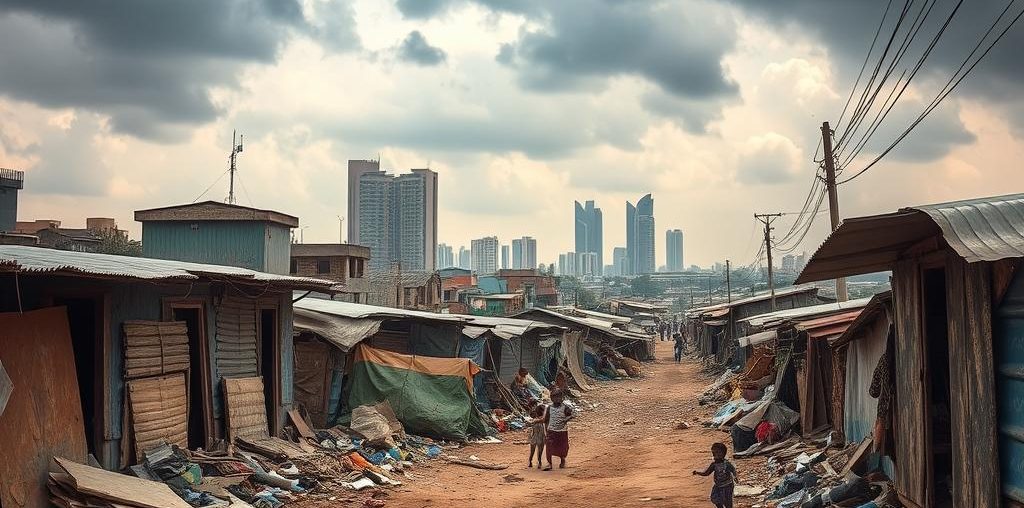Nigeria is Africa’s most populous country, facing a big issue with destitution. Lately, more Nigerians are living in poverty. This crisis affects not just individuals and families but also the nation’s social and economic health.
Poverty in Nigeria has many causes. These include income inequality, barriers to moving up in life, and issues like food insecurity and poor healthcare and education access. These problems make destitution worse for many people.
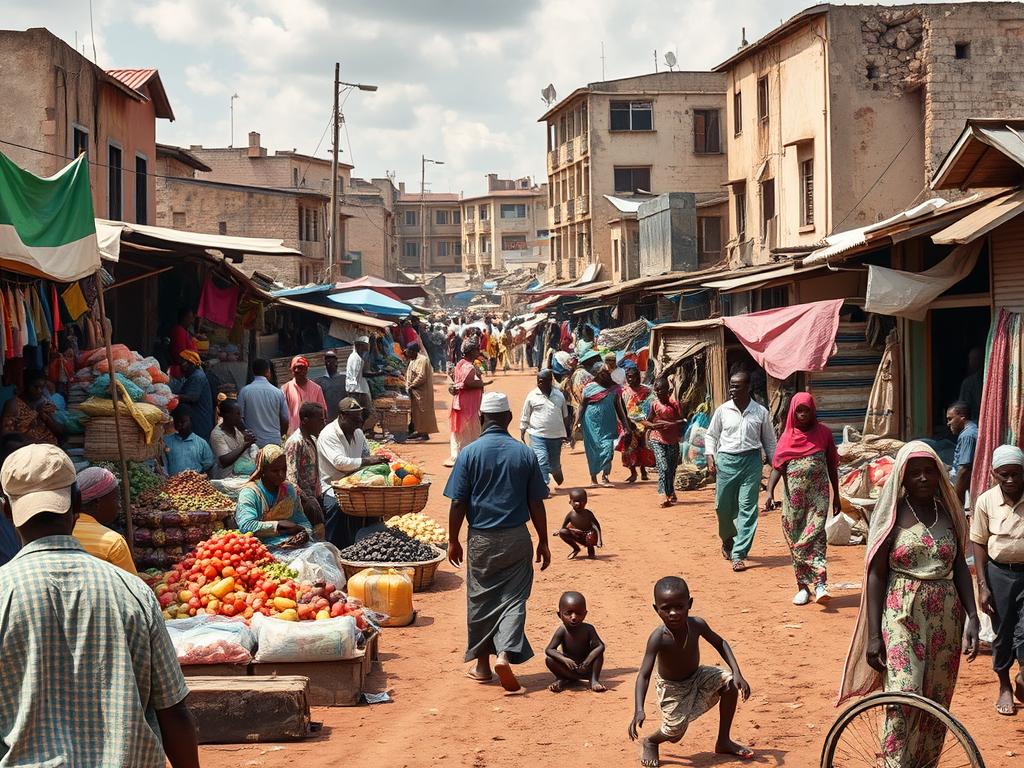
Nigeria aims to meet the United Nations’ Sustainable Development Goals (SDGs), including ending poverty. It’s vital to understand the depth of this issue, its causes, and the need for lasting solutions. This article will look at how poverty affects people, communities, and the nation. It will also talk about how policymakers, civil society, and the world can help solve this big problem.
Understanding the Scope of Poverty in Nigeria
Poverty is a big problem in Nigeria, affecting many people. It’s important to understand what poverty means and how it affects the country.
Defining Poverty and Its Multidimensional Impact
Poverty is more than just not having enough money. It means not having basic things like clean water, enough food, good healthcare, and education. This makes it hard for people to improve their lives and reach their goals.
Analyzing Poverty Statistics and Trends in Nigeria
Recent data shows a tough situation in Nigeria. According to the National Bureau of Statistics, the poverty rate in Nigeria was 40.1% in 2019, with over 82 million people living in poverty. The COVID-19 pandemic has made things worse, pushing more people into destitution and food insecurity.
There’s also a big gap in wealth and resources, causing more income inequality. This gap makes it hard for people to move up in life and get the opportunities they need.
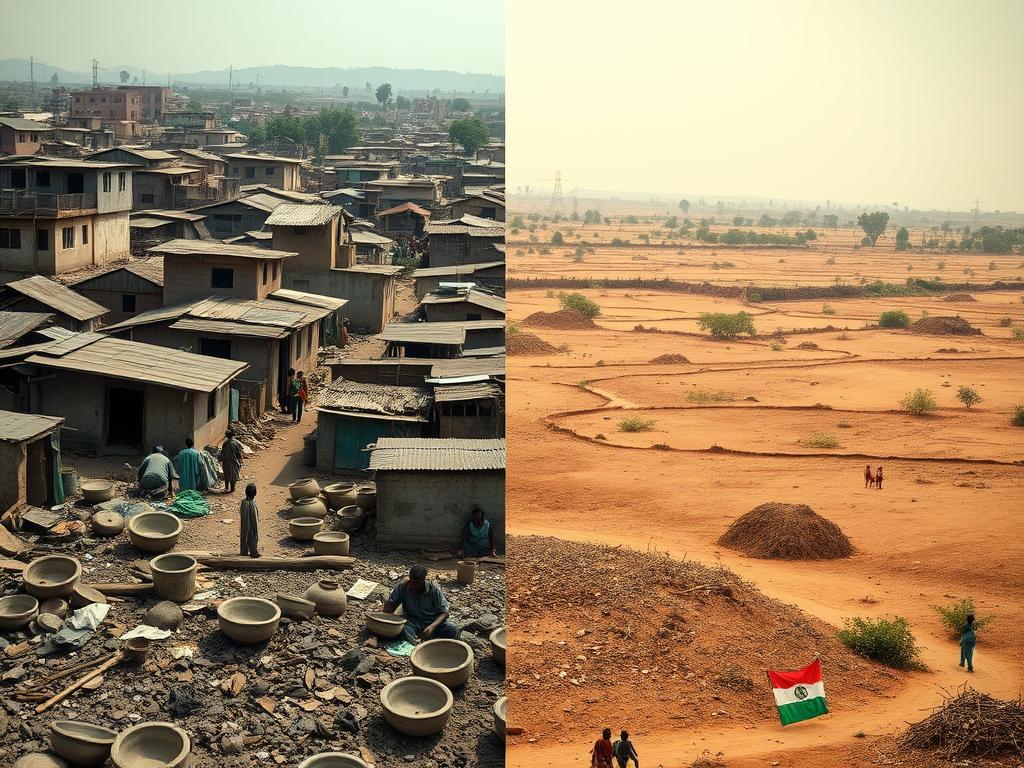
It’s important to understand the complex nature of poverty and look at the latest data. This helps us make better plans to tackle destitution in Nigeria.
Root Causes of Poverty in Nigeria
Nigeria’s poverty is due to many economic, social, and political issues. Income inequality is a big part of this problem. It means some people have a lot of wealth, while others have very little. This makes it hard for many Nigerians to get out of destitution.
Not having enough money and resources is a big issue. Also, not everyone can get good education or healthcare. This stops many people from improving their lives.
Nigeria depends too much on oil, which has led to ignoring other important areas. This makes the economy unstable and hard to grow. Corruption and poor management of money also take away from things that help people, making destitution worse.
- Unequal distribution of wealth and resources
- Limited access to quality education
- Inadequate healthcare accessibility
- Overreliance on oil exports and vulnerability to global price fluctuations
- Widespread corruption and mismanagement of public resources
To fix poverty in Nigeria, we need to tackle many problems at once. We must make sure institutions are strong, support everyone’s growth, invest in people, and make sure public money is used right.
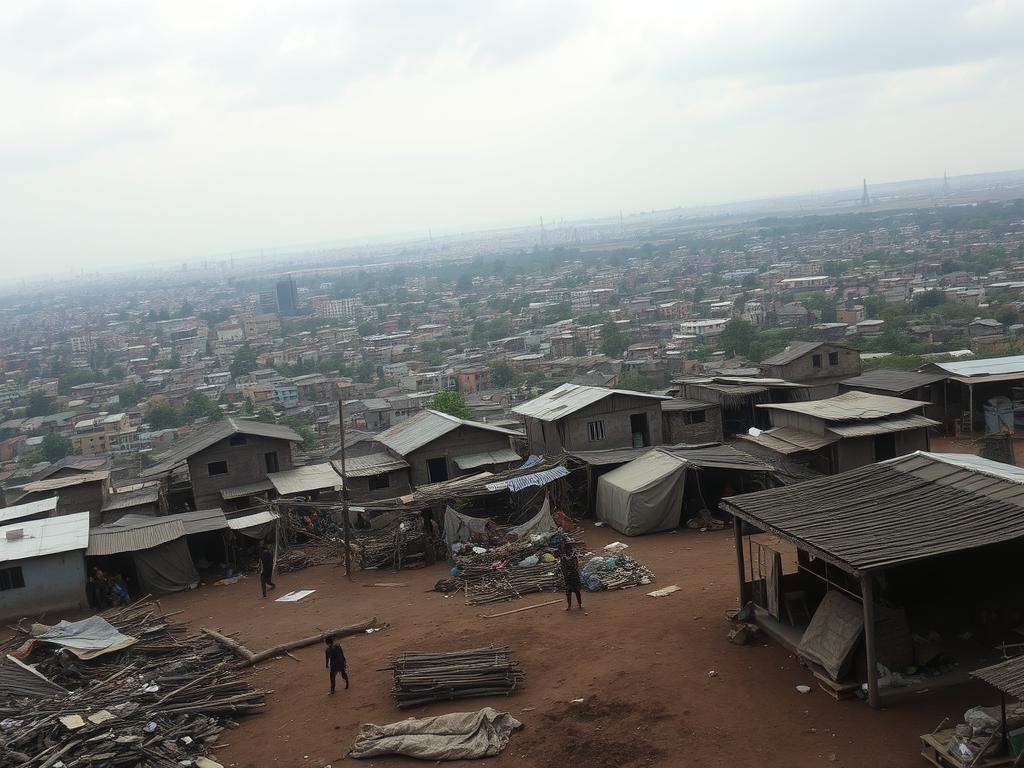
| Root Cause | Impact on Poverty |
|---|---|
| Income Inequality | Unequal distribution of wealth and resources, limiting economic opportunities for the majority |
| Limited Access to Education | Lack of skills and knowledge necessary for meaningful employment and economic advancement |
| Healthcare Accessibility Challenges | Inability to afford and access quality healthcare, leading to poor health outcomes and further impoverishment |
| Overreliance on Oil Exports | Economic vulnerability to global price fluctuations, hindering sustainable development |
| Corruption and Mismanagement | Diversion of public resources away from critical social services and infrastructure, perpetuating the cycle of poverty |
Income Inequality: A Persistent Challenge
Nigeria is working hard to overcome income inequality. The gap between the rich and the poor is getting bigger. This issue affects Nigeria’s social and economic life deeply.
Widening Gap Between Rich and Poor
The rich live in luxury, while the poor face hard living conditions. This shows how big the gap is in Nigerian society. Income inequality is rising. The top 20% own a lot, while the bottom 40% can barely afford the basics.
Barriers to Economic Mobility and Opportunity
Not having good education, healthcare, and jobs stops the poor from moving up. This keeps poverty and income inequality going. It also stops Nigeria from growing economically and meeting human rights for everyone.
| Indicator | Value |
|---|---|
| Gini Coefficient (Income Inequality) | 35.1 |
| Poverty Headcount Ratio | 40.1% |
| Unemployment Rate | 33.3% |
The table shows how big the income inequality problem is in Nigeria. We need strong solutions to fix this and give everyone a fair chance.
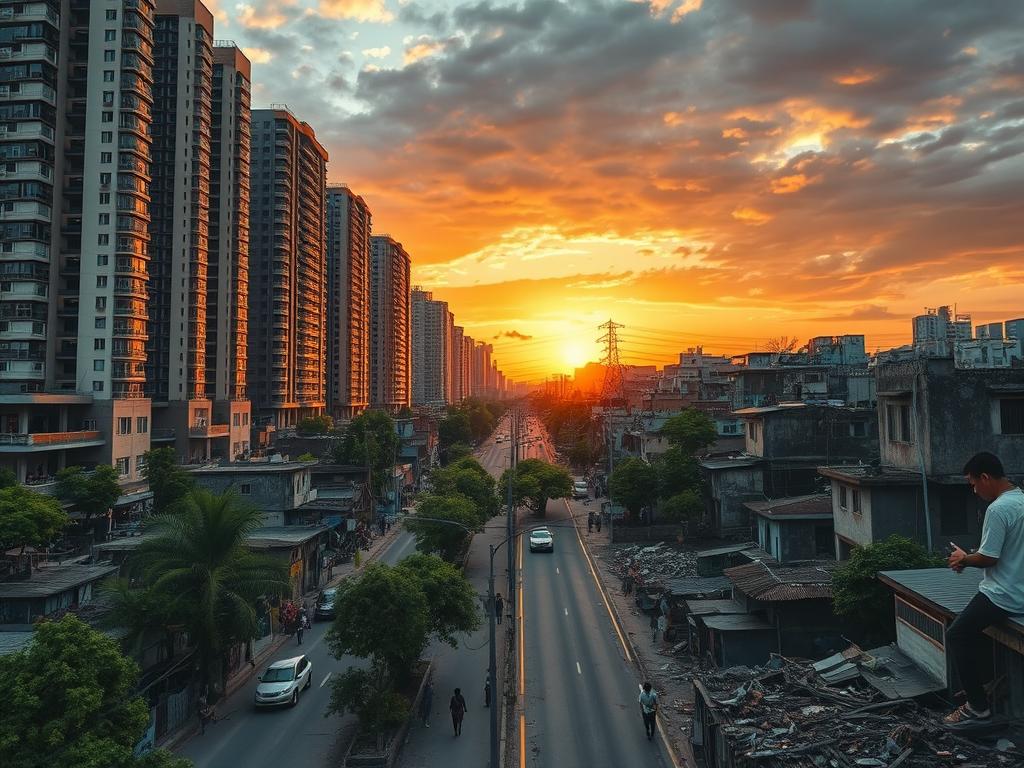
Poverty and Food Insecurity in Nigeria
Poverty and food insecurity are big problems in Nigeria. They are closely linked and have severe effects on health and well-being. Many Nigerians struggle to get the nutritious food they need because of poverty and food insecurity.
Malnutrition and Its Long-Term Consequences
Malnutrition is a big issue in Nigeria, affecting kids and adults. Malnutrition can cause stunting, wasting, and not getting enough nutrients. These problems can harm a person’s growth and brain development.
Kids who don’t get enough food may grow slower, have weaker immune systems, and have trouble learning. This can affect their school performance and future jobs. Malnutrition can also lead to serious health issues like diabetes and heart disease later on.
To fix these issues, Nigeria needs to tackle poverty and food insecurity. This will help reduce malnutrition and make the population healthier.
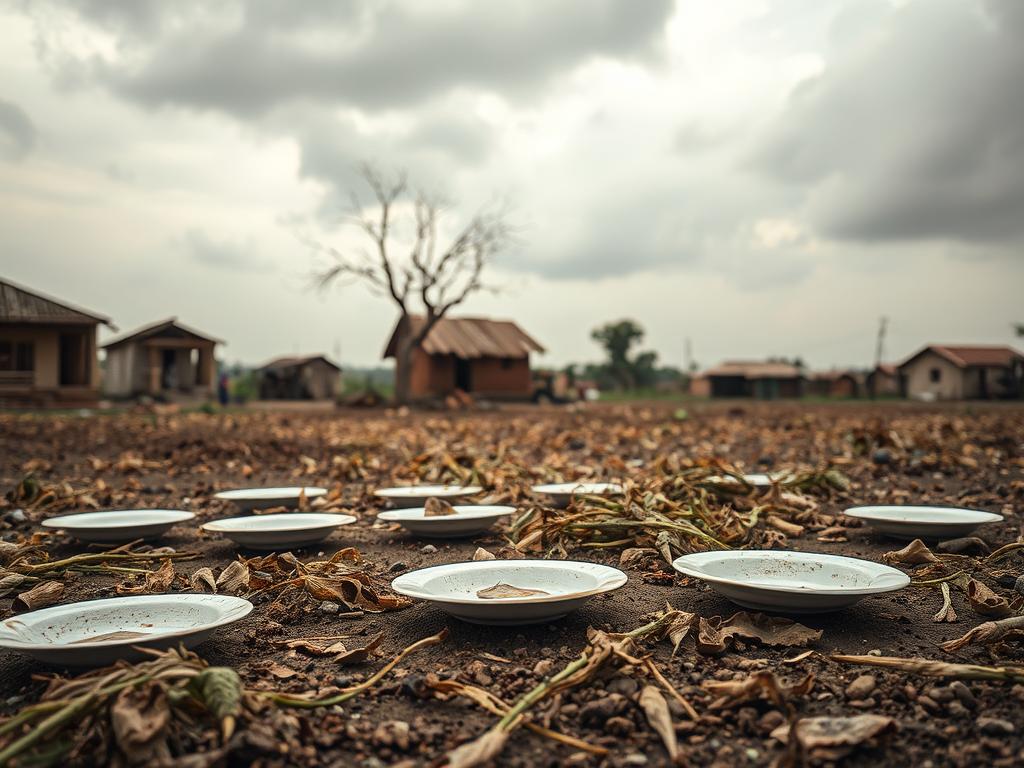
Homelessness and Inadequate Housing
In Nigeria, poverty deeply connects with homelessness and poor housing. As destitution grows, more Nigerians lose their stable homes. They live in bad conditions or on the streets.
Recent data shows 15 million Nigerians are homeless. This number shows how big the problem is. Many live in poor areas or makeshift homes without basic needs like clean water and electricity.
There’s a big shortage of affordable homes. Low-income people can’t afford to rent or buy homes. This makes things harder for the most vulnerable Nigerians.
To fix homelessness and poor housing, we need a complex plan. We must tackle destitution and find lasting solutions. We should invest in affordable homes, support social welfare programs, and help communities help themselves.
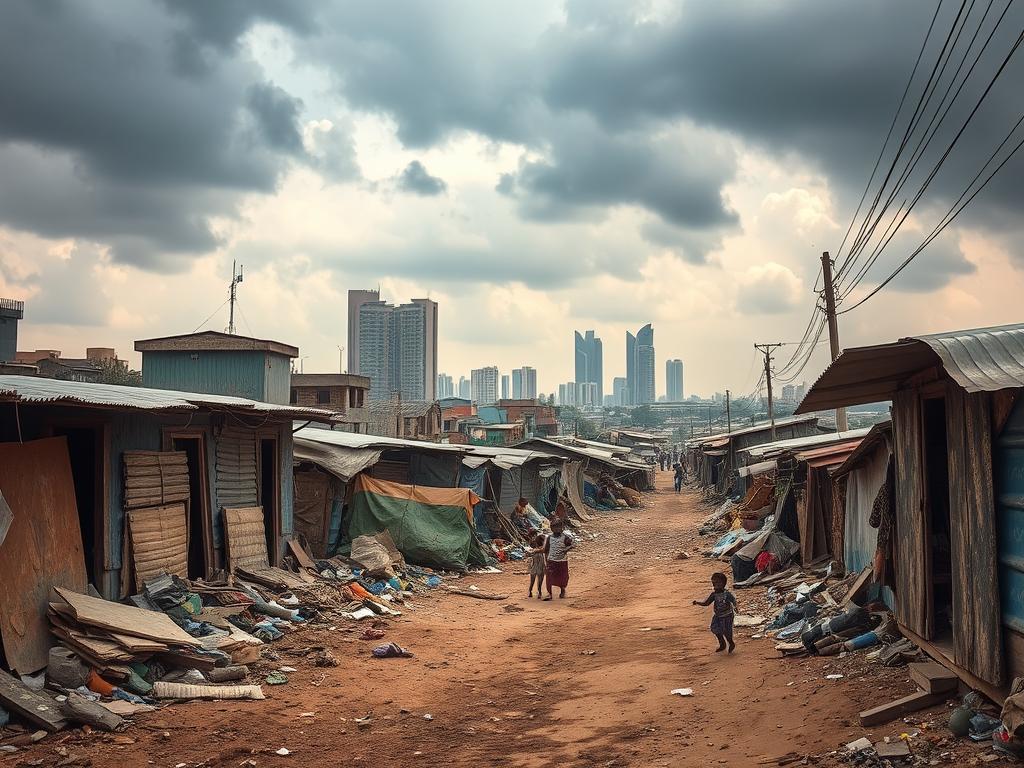
Homelessness and poor housing have big effects. They can lead to health problems, less education and job chances, and a cycle of poverty. Fixing this issue is key to social justice and a better Nigeria.
Impact of Poverty on Education and Healthcare
Poverty is a big problem in Nigeria, affecting millions of people. It goes beyond just basic needs, reaching into education and healthcare. This traps the poor in a cycle of disadvantage.
Barriers to Accessing Quality Education
Poor families can’t afford education costs like tuition, books, uniforms, and transport. This makes many kids give up on their dreams. Without good schools and resources, poor areas get left behind, keeping poverty going.
Healthcare Accessibility and Affordability Challenges
Poverty also makes healthcare hard to get. Poor families can’t afford medical services, from check-ups to treatments. High healthcare costs and few cheap options force them to choose bad care. This hurts their health and work, affecting whole communities.
Dealing with poverty, education, and healthcare is hard in Nigeria. We need a big plan to help the poor. This plan should give them the tools and chances to escape destitution and get their basic rights back.
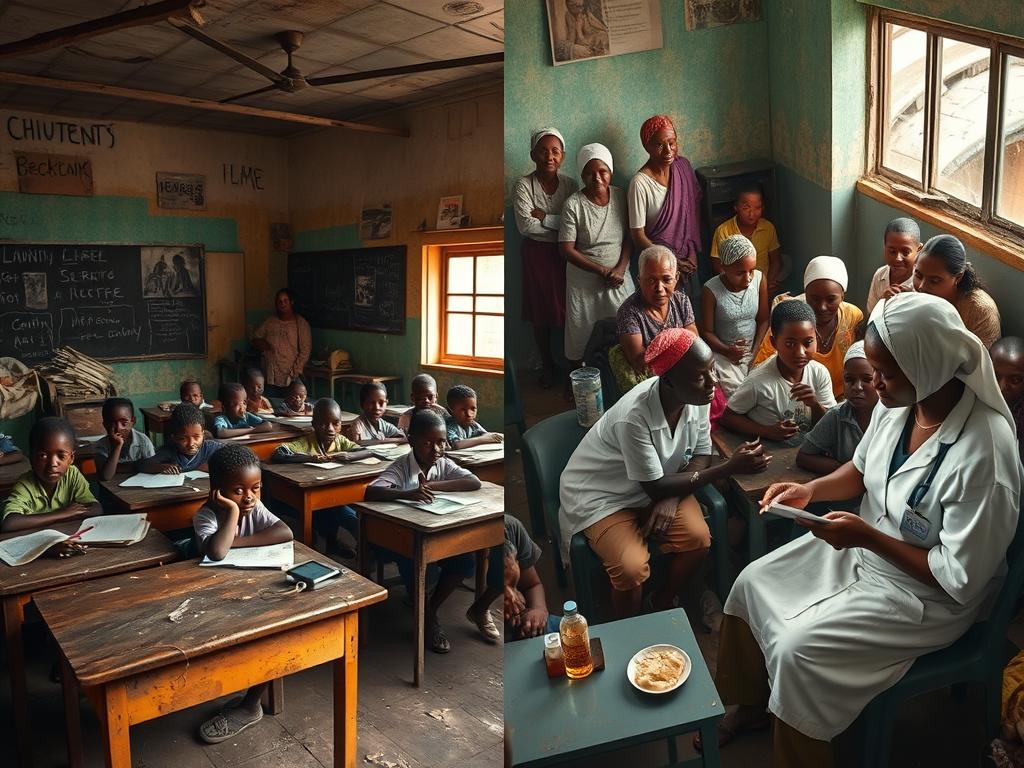
Role of Social Welfare Programs and Economic Development
Dealing with destitution in Nigeria needs a complex plan. This plan should include social welfare programs and efforts to improve the economy. Nigeria has tried different ways to help the poor, but we’re still checking if they really work.
Evaluating Existing Poverty Alleviation Initiatives
The Nigerian government has started many social welfare programs to fight poverty and better people’s lives. These efforts include giving cash, small loans, and building infrastructure. But, not everyone agrees how well these programs work because of concerns about who they help and if they last.
It’s important to look closely at these programs to make them better. We should check how well they reach people, if they really help those in need, and if they solve the big problems of poverty. This means looking at things like healthcare, education, and basic needs.
| Poverty Alleviation Program | Key Objectives | Coverage and Reach | Effectiveness in Reducing Poverty |
|---|---|---|---|
| National Social Investment Program (NSIP) | Provide cash transfers, microcredit, and skills training to vulnerable populations | Aims to reach 10 million households, but currently covers around 4 million | Mixed results, with challenges in targeting and monitoring the program’s impact |
| Conditional Cash Transfer (CCT) Program | Provide cash transfers to families contingent on their children’s school attendance and healthcare | Covers approximately 1 million households, but limited geographic coverage | Positive impact on school enrollment and healthcare utilization, but more research needed on long-term effects |
| Youth Employment and Social Support Operation (YESSO) | Provide employment opportunities and vocational training to youth in underserved communities | Reaches around 50,000 youth, but limited scale compared to the overall youth population | Promising results in improving employability and income levels, but challenges with sustainability and scalability |
We also need to look for new and lasting ways to fight poverty. This means using economic strategies that create jobs, encourage starting businesses, and make growth fair for everyone.
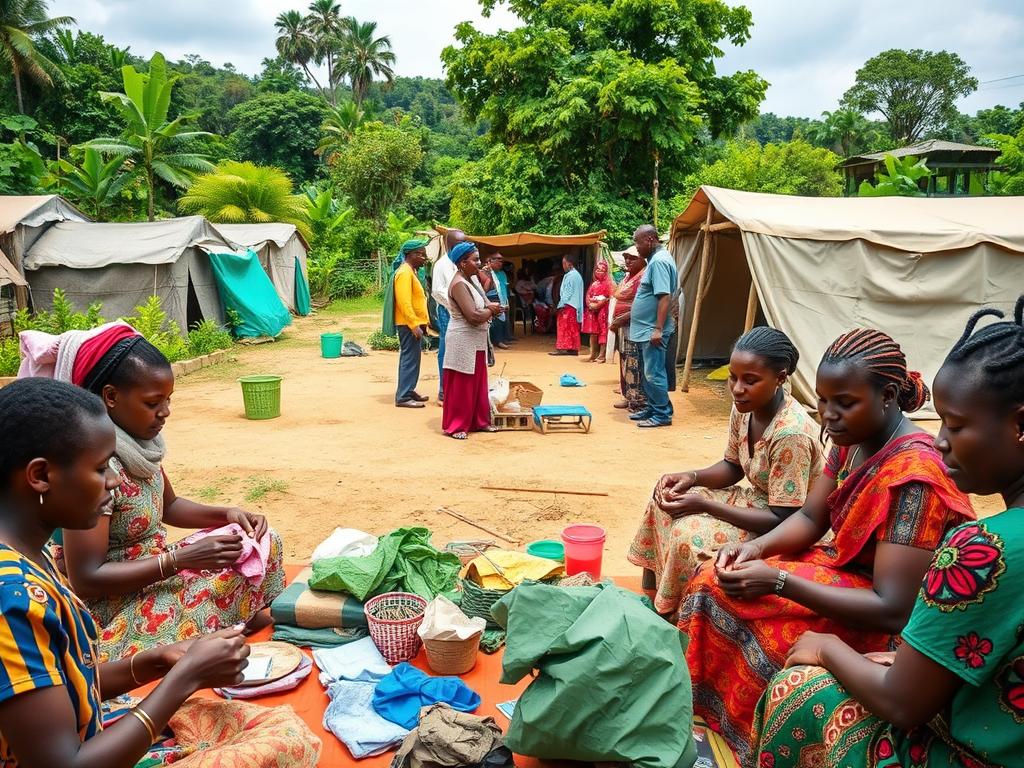
Poverty and Human Rights Violations
Poverty in Nigeria is more than just an economic issue; it’s a human rights crisis. It denies people basic needs and services, affecting their fundamental rights. This section looks at how poverty and human rights are linked in the country.
Those living in destitution often can’t get to basic things like food, water, and healthcare. Inadequate housing and homelessness take away their right to privacy and a decent place to live. Not being able to afford good healthcare and barriers to education also deny them the right to health and learning, making poverty worse.
Poverty can lead to bad work conditions, child labor, and human trafficking, breaking the rights to freedom and fair work. Without jobs or safety nets, people might turn to crime, losing more rights.
| Human Rights Affected by Poverty | Impact on Individuals and Communities |
|---|---|
| Right to an adequate standard of living | Lack of access to food, water, sanitation, and housing |
| Right to health | Barriers to accessing quality healthcare |
| Right to education | Limited opportunities for quality education |
| Freedom from slavery and forced labor | Exploitative labor practices, including child labor and human trafficking |
| Civil and political rights | Forced engagement in illicit activities due to lack of economic opportunities |
Fixing poverty and its effects on human rights is key to reaching the Sustainable Development Goals (SDGs), like SDG 1 (No Poverty) and SDG 10 (Reduced Inequalities). We need plans that improve the economy, offer social support, and focus on human rights. This way, everyone in Nigeria, no matter their wealth, can have their basic rights respected and supported.
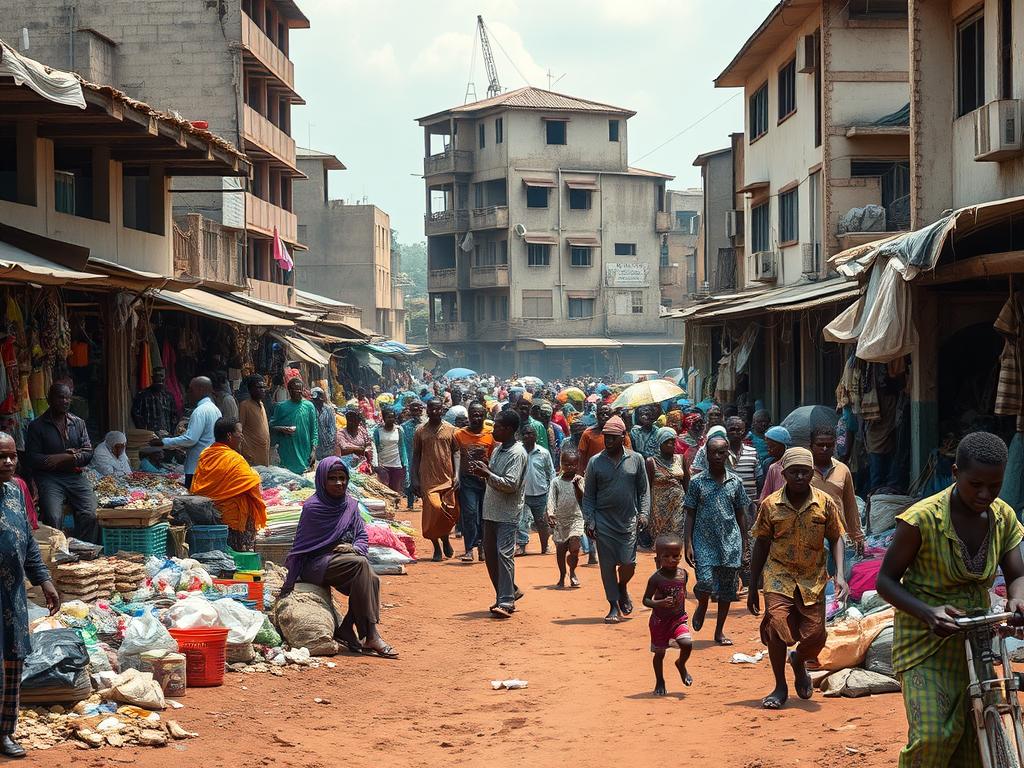
Sustainable Development Goals (SDGs) and Poverty Reduction
The Sustainable Development Goals (SDGs) were adopted by the United Nations in 2015. They aim to tackle poverty, inequality, and environmental issues worldwide. Nigeria faces a big challenge with destitution. The SDGs provide a plan to help improve the lives of millions.
The main goal is to end all forms of poverty by 2030. This means tackling not just income poverty but also issues like education and healthcare access. Nigeria is working to match its national plans with the SDGs. Yet, there are still big hurdles to overcome.
Dealing with poverty’s deep causes, like income gaps and limited job chances, is key. Investing in social welfare, education, and healthcare is essential. By working together with governments, civil groups, and businesses, Nigeria can use the SDGs to bring about real change. This will help create a fairer and wealthier future for everyone.
FAQ
What is the current state of poverty in Nigeria?
Nigeria is facing a severe poverty crisis. Over 40% of its people live below the poverty line. Poverty is widespread, especially in rural areas. It’s made worse by income inequality, lack of basic services, and economic stagnation.
What are the root causes of poverty in Nigeria?
Poverty in Nigeria has many causes. These include economic issues like low productivity and high unemployment. Social issues like limited education, healthcare, and social welfare also play a part.
How does income inequality contribute to the persistence of poverty in Nigeria?
Income inequality is a big problem in Nigeria. It creates a wide gap between the rich and the poor. Many people struggle to get economic opportunities and move up in life.
What is the link between poverty and food insecurity in Nigeria?
Poverty and food insecurity are closely linked in Nigeria. Many people, especially the poor, suffer from malnutrition and hunger. This leads to long-term health problems and keeps destitution going.
How does poverty impact access to education and healthcare in Nigeria?
Poverty makes it hard for people in Nigeria to get good education and healthcare. Poor families often can’t afford school for their kids. They also can’t pay for medical care, which leads to unequal health and education outcomes.
What role do social welfare programs and economic development initiatives play in addressing poverty in Nigeria?
Social welfare programs and economic development are key to fighting poverty in Nigeria. But, these efforts haven’t been very effective. We need more comprehensive and lasting solutions to tackle poverty’s complex issues.
How is the issue of poverty linked to human rights violations in Nigeria?
Poverty in Nigeria is linked to human rights violations. People lack basic rights like enough food, housing, healthcare, and education. This affects the poor the most, creating a cycle of deprivation and inequality.
What progress has Nigeria made in achieving the Sustainable Development Goals (SDGs) related to poverty reduction?
Nigeria has made some progress towards the Sustainable Development Goals (SDGs) on poverty reduction. But, there are still big challenges. The country needs to work harder to tackle poverty’s complex issues and meet the SDGs.

